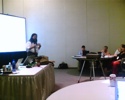For my pre-conference seminar I chose to attend Bryan Alexander and Barbara Ganley’s seminar on social software, teaching and learning. I’ve spoken with Bryan about social software, and seen him present at NLII (now ELI), but I’ve never had the chance to attend any of his workshops.
The seminar has a web site where all of the materials for the class have been placed.
Barbara began by grounding the conversation in teaching and learning – this is the focus of today’s seminar. She reminded us that Dewey said that learning is a social activity. She suggests that we consider the learner as a node in a network. Doing the discipline unites learning the discipline and learning new literacies. Social software puts the students in the center; the dynamic of the class changes.
Bryan pointed out that students have used the technology but have not reflected on the implications and possibilities about the software. He described blogs as blobs of microcontent presented in reverse chronological order. Blogs are not new, they are old, established and huge in size. Technorati says there are 50 million blogs in the world. Even if you doubt the specific number, there are a lot of blogs.
Bryan talked about community blogs, specifically ErieBlogs.com, where everyone in the community can blog. There’s even competition between the community blog site and the local newspaper. Baghdad Burning blogs the war in progress – something unparalleled in history.
Warblogs: Blogs devoted to a conflict. The Command Post is an example of this. A Blog Carnival is a blog post that aggregates various blog posts on a specific topic.
Barbara suggests that a blogger starts writing, but then communities form around that person, connecting as nodes in a network. If one blogger vanishes from such a network, the network can survive.
Bryan showed a Middlebury blog that aggregates blog posts from Middlebury students studying abroad. Barbara says blogs are about conversation, reflection and linking.
What about blogs as a permanent record of someone’s mistakes? Barbara says that education is a cycle of disruption and repair, not some neat and tidy experience with no errors. Class-based blogs are webbed, with students commenting and reflecting. Thought evolves over the course of the class and it’s good for the blog to record that progress.
Once the faculty posts a comment to a blog, it effectively ends conversation. So Barbara holds off on posting comments so she can let the students build the conversation themselves.
Blogging allows for informal learning to merge with formal learning.
My note-taking was poorer this afternoon:
Wikipedia as a source: faculty generally don’t accept encyclopedia entries as sources in research. Wikipedia is a starting point, not a destination.
Barbara has the students create their own guide to using the wiki. She also finds PBWiki to have very easy templates.
Unless someone starts a wiki page, it’s very hard for others to start.
Del.icio.us for classes, especially social science classes. Penn State’s library has a tag page for books in their library.
Student-produced podcasting is much better than “prof-casting”.
Barbara made a good point about modeling student performance in first-year vs. third-year courses. We explain the grading system but don’t explain the level of the content we expect them to be able to review and produce.
More on this if I get the time to reflect.
Technorati Tags: blogging, EDUCAUSE2006, learning, E06SEM02F, social software, teaching, wikis




Kevin,
I am SO glad you went to this session and can’t wait to pick your brain when you get back! I follow Barbara’s class blogs and am fascinated with the way she uses these tools in ways I hadn’t imagined. Did she talk at all about how she does or does not bring the blogs into class? How does face-time change for her now that she has them do this kind of work outside of class? Or do they actually write the blogs in class? The Cardinal’s blog really killed me : )
Thanks for blogging this, Kevin!